Performing Heritage / The Intramuros Project
DURATION: 12 Months (1 April 2019 to 30 March 2020)
FUNDING: Office of the Vice Chancellor for Research and Development Outright Grant (Php 300,000.00)
PUBLICATION:
Tiatco, Sir Anril P., Bryan L. Viray, and Olivia Kristine D. Nieto. The Intramuros Project: Performing Heritage, Performed Ethnography, and Document Performance. Asian Studies: Journal of Critical Perspectives on Asia 57, vol. 2 (2021): 99–147.
ABOUT THE PROJECT:
The project deployed methodologies from theatre studies, anthropology, and heritage studies. Specifically, the project was inspired by ethnography; interested in the narratives of the community members we encountered during the fieldwork conducted on the weekends between March and September 2019 from the walled city of Intramuros, the research team sought to document their conceptions and perceptions of heritage and cultural development. At the same time, it was a performance of that ethnography, devised by the research team-turned-dramaturgs from their annotations of the collected narratives. For the research team, devising a performance manuscript serves a better tool to foreground the main agenda of the project: to problematize the concept of heritage. The writing of the play was necessary because the research team felt that the narratives possessed some dramatic attributes: they involved several tensions, and they were character-driven and highly dialogic.
The narratives we used came from the “underrepresented” members of the Intramuros community, such as the store owners, attendants of different places of interest, tricycle or pedicab (non-motored tricycle) drivers, kalesa (carriage) drivers, tour guides, on-the-job-training tourism students, and informal settlers. Intramuros or Old Manila is one of the most popular tourist destinations in the City of Manila. This walled city is the lone district of Manila where colonial Spanish influences are still plentiful. Because of these colonial structures, Intramuros is publicized as a heritage city. The San Agustin Church inside the walled city is one of the four Baroque Churches in the Philippines, collectively inscribed as a UNESCO World Heritage Site. The outline of the walls of Intramuros is the buffer zone of the aforementioned heritage site; hence, the UNESCO inscription isunofficially extended to the entire Old Manila.
The dramaturgical team worked on a definition of heritage as “a constitutive cultural process that identifies things and places (such as the Intramuros), that can be given meaning and value as ‘heritage,’ reflecting contemporary cultural and social values, debates and aspirations” (Smith 2006, 3). We devised the performance material because the informants, as their narratives imply, belong to the workforce of the heritage zone, and contribute significantly to the development of the space (Intramuros) as aheritage locale. They have witnessed how the walled city progressed and even decayed. Apart from those of the informants, the performance material also incorporates research on heritage and write-ups on Intramuros.
The creative output of this project The Intramuros Project is a docudrama, based on our ethnographic data and other documentary materials available. The documentary piece was read theatrically (stage-reading) via the video conferencing application ZOOM on 28 May 2020. Originally, the dramatic/ stage-reading was scheduled on 20 March 2020 (Friday) at the UP Theatre Stage. But due to the COVID-19 pandemic and the death of two individuals in my family, the reading was postponed until a final date was set with the members of the research team.
THE ORIGINAL POSTER:
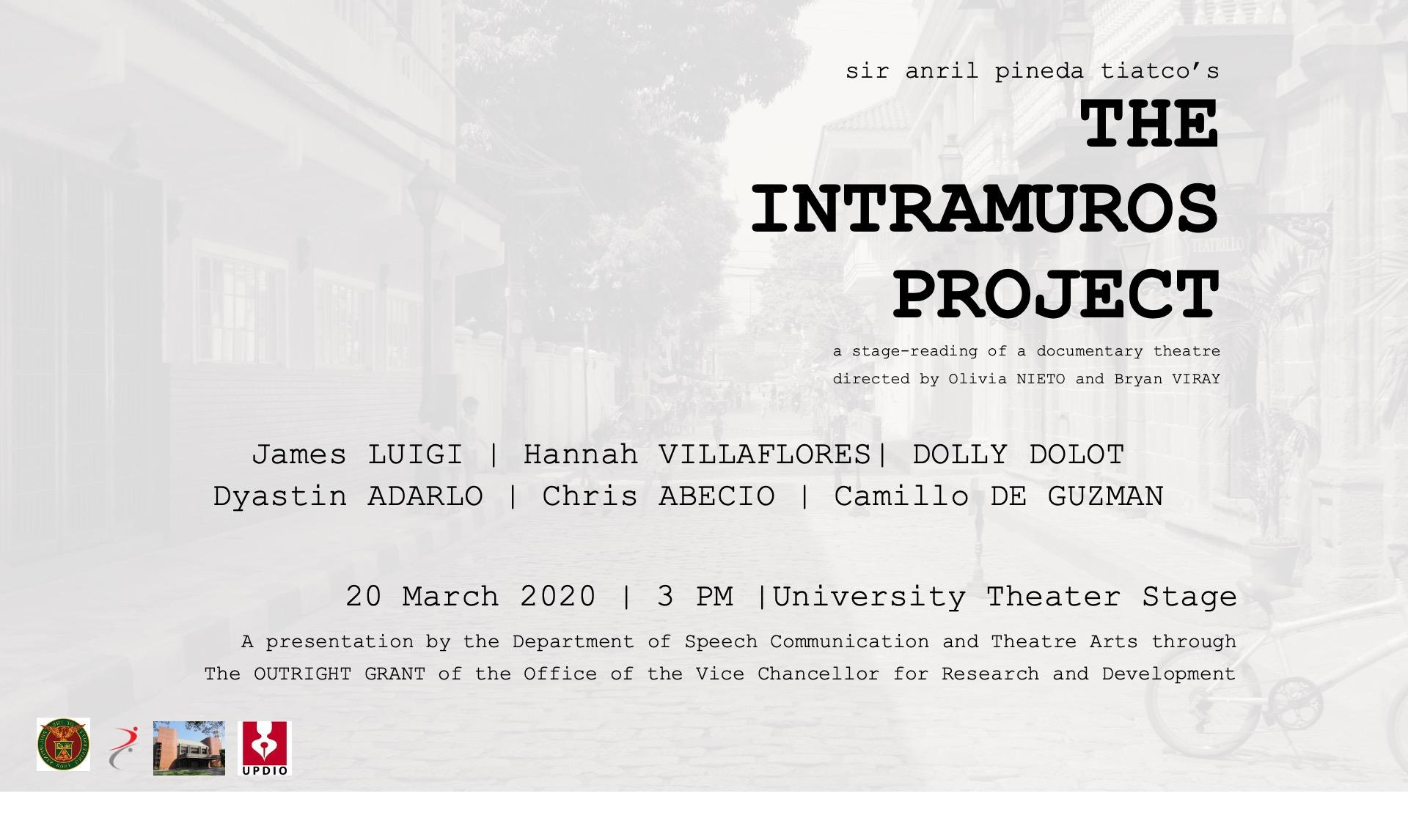
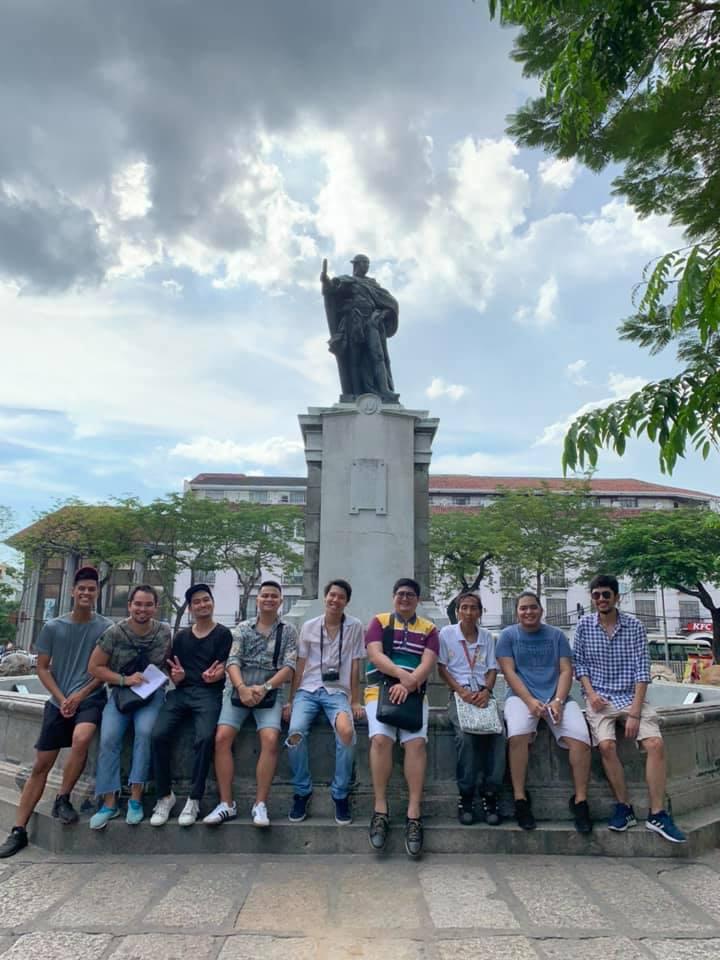
The research team composed of graduate and undergraduate students and faculty members from the Department of Speech Communication and the Department of History. From Left to Right: Dyastin Alario, Dolly Dolot, James Luigi, Davidson Oliveros, Camilo De Guzman, Sir Anril P. Tiatco, Kuya Boy (Informant), Cris Abecio, and Micheal Bernal.
Repetitions and Alterations: Dramaturgy of Collaborative Adaptations
DURATION: 18 Months (23 March 2018 - 22 September 2019)
FUNDING: UP Enhanced Creative Work and Research Grant (Php 550,000.00)
PUBLICATIONS:
Tiatco, Sir Anril P. and Bryan L. Viray. “Performing Human Rights: Pista Rizalina’s Interrogation of Martial Law, Extra Judicial-Killings and Historical Revisionism at the Cultural Center of the Philippines.” JATI: Journal of Southeast Asian Studies 23, No. 1 (2018): 215 - 239.
Tiatco, Sir Anril P. “Staging the Banality of Social Evil: Faust in/and Philippine Contemporary Social Politics.” In Performing Southeast Asia: Contemporary, Politics and Performance, ed. Marcus Tan and Charlene Rejandren, 113 – 143. Macmahon: Palgrave Macmillan, 2020.
ABOUT THE PROJECT:
The research reflects how theatre adaptation (focused on Metropolitan Manila) informs the contemporary (read here as the “newness” of everyday life) in the Philippines. It is also an inquiry regarding how Philippine contemporary informs the dramaturgy of collaborative adaptation. Generally, it is a reflection on the content and the context of theatrical adaptations based on multiple authors despite "authorial belonging" in many adaptation studies is often pointed towards a singular authority (commonly the playwright in the Philippines or the director in other countries). The arguments are based on twofold purviews: emic perspectives of theatre artists involved in collaborative adaptations and an etic discussion based on auto-reflexive analyses of personal encounters on theatrical adaptations as dramaturg for many productions. The turn to dramaturgy of collaborative adaptation is based on the following assumptions: the practice is a conceptual and a practical model for developing critical and creative skills simultaneously; and dramaturgy is the link for the integration and the separation of the original work (adapted) to the contemporary work (adaptation).
Many have theorized the necessity of adaptation through a procedural understanding (i.e. intercultural and cross-cultural). While the project is not to dismiss the potential theorization of a specific process (i.e. the Filipino process), the project is a substantial inquiry on the reasons behind the process to understand why Filipino theatre artists engage in adaptation as critical and creative strategies to produce something original despite being hailed as repetitions. The project is divided into three parts: a series of interviews involving theatre artists whose constant practices in doing theatre is dramaturgy of collaborative adaptation; the specifics of dramaturgy and how it helps in restructuring and deconstructing original works (adapted) with the adaptation; and a contextualization or a close-reading focused on the entanglement of three performative objects: the interviews, dramaturgical theories and the productions.
Generally, the research asks the question: how does theatre adaptations activate the contemporary? To answer the problematique, I aim to answer three interrelated questions.
- What is the context of the adaptation that theatre artists perform to activate the concept of the contemporary?
- How is the adaptation performed? (What are the strategies / techniques of the theatre artists in transforming the original subjects into renewed subjects to audience members?)
- What kind of representations are activated on stage via adaptations signifying a more nuanced understanding of the contemporary?
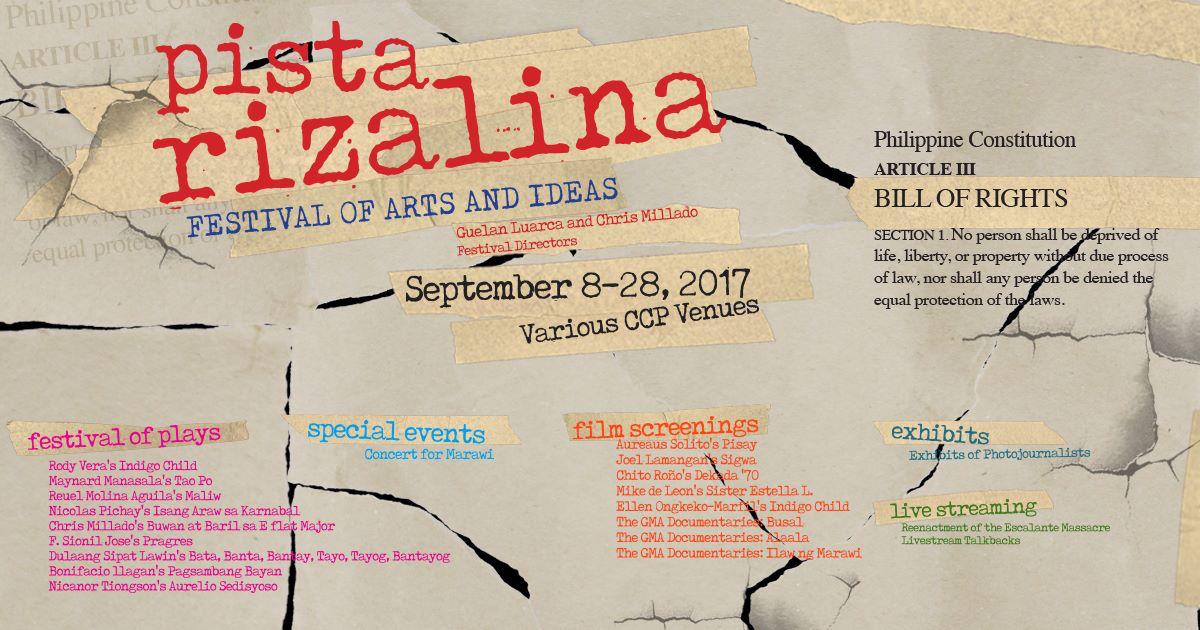 Pista Rizalina, a festival on human rights staged at the Cultural Center of the Philippines staged from 8 to 28 September 2017. The festival was the subject of the essay I co-authored with Bryan L. Viray for the project.
Pista Rizalina, a festival on human rights staged at the Cultural Center of the Philippines staged from 8 to 28 September 2017. The festival was the subject of the essay I co-authored with Bryan L. Viray for the project.
Philippine Performance Archive: Cultural Performances
DURATION: 24 Months (8 March 2016 to 7 March 2018)
FUNDING: UP Emerging Interdisciplinary Research Program (Php 4.2M)
ABOUT THE PROJECT:
The objectives of the project are the following: develop an archive of Philippine cultural performances (i.e., rituals, festivals, spectacles, and related performances) and scholarship resource materials; annotate collected materials for the use of researchers, scholars, academics, students, teachers, practitioners, and general audience of Philippine cultural performances; expand discussions of these performances via a comparative analysis with cultural performances in the archipelago; generate a comprehensive list of bibliographic materials about Philippine cultural performances for the consumption of researchers, scholars, academics, students, teachers, practitioners, and general audience of Philippine performance culture; and produce an interactive database relevant for the study of cultural performances.
PUBLICATIONS:
Tiatco, Sir Anril P. “Performing Gender and Devotion in the Peñafrancia Festival in the Philippines.” In JATI: Journal of Southeast Asian Studies 25, No. 2 (2020): 150 - 173.
Tiatco, Sir Anril P. “Performing the Traditional Fiesta in Batanes: Pistang Chavayan in Sabtang Island, Philippines.” In Asian Studies: Journal on Critical Perspectives on Asia 56, No. 1 (2020): 114 – 125.
Tiatco, Sir Anril, Jem R. Javier and Bryan L. Viray. 2019. “The Philippine Performance Archive on Cultural Performances: The Archive as a Performative Cultural Memory and Pedagogy (Chapter 3).” In Digital Humanities and New Ways of Teaching, ed. by Ann Wing-bo Tso, 33 – 52. Singapore: Springer.
Tiatco, Sir Anril P. 2019. Panata, Pagtitipon, Pagdiriwang: A Preliminary Contextualization of Cultural Performances in the Philippines. Humanities Diliman 16 (1): 54 – 81.
Tiatco, Sir Anril P, Jem R. Javier and Madilene Landicho. 2018. “Recuperating and Reimagining the Palo-Palo in Batanes, Philippines: From Colonial Legacy to a Performance of Solidarity and Friendship.” In Asian Theatre Journal 35 (1): 177 – 194.
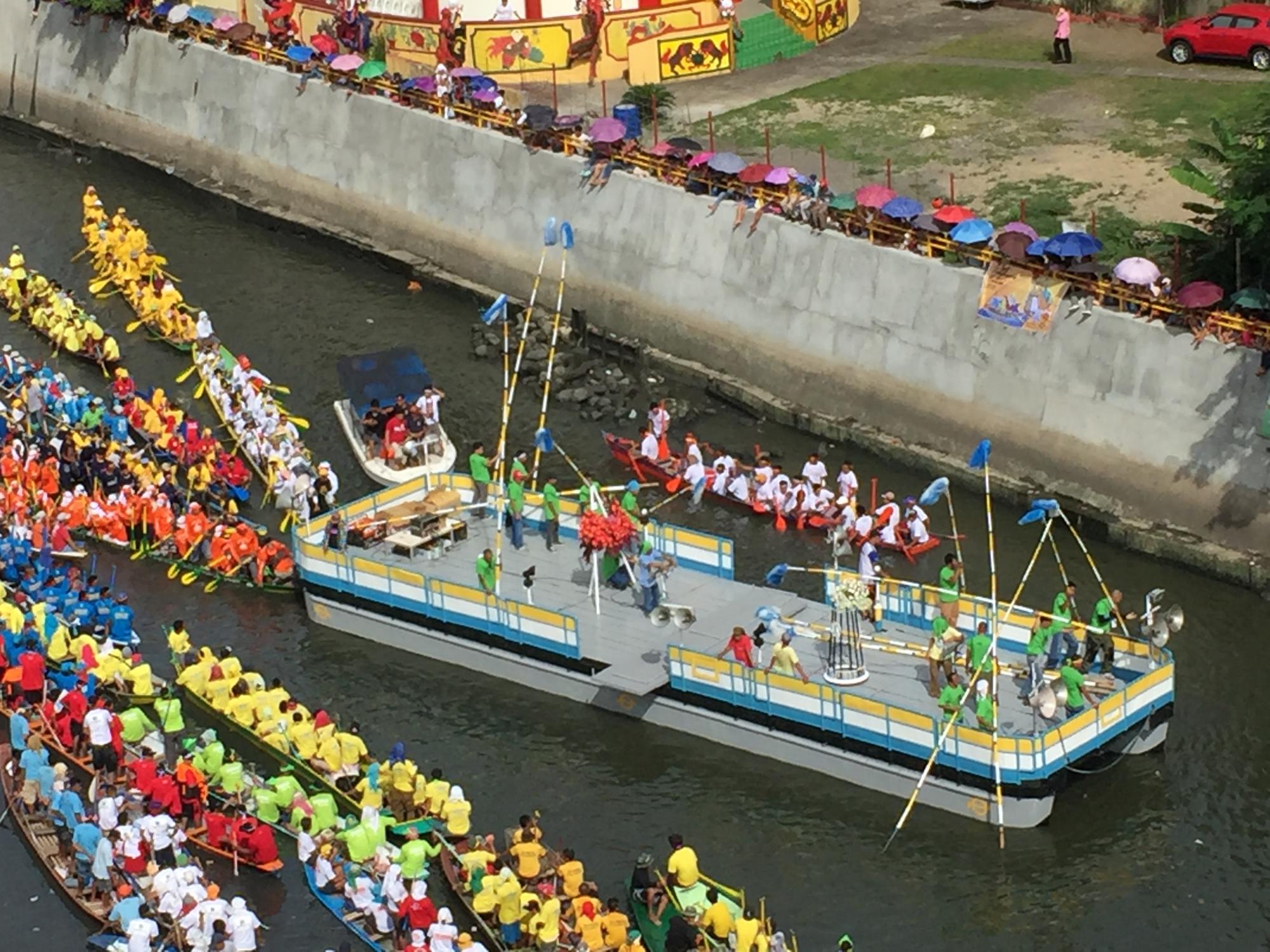 Fieldwork in Naga City during the Peñafrancia Festival in September 2017.
Fieldwork in Naga City during the Peñafrancia Festival in September 2017.
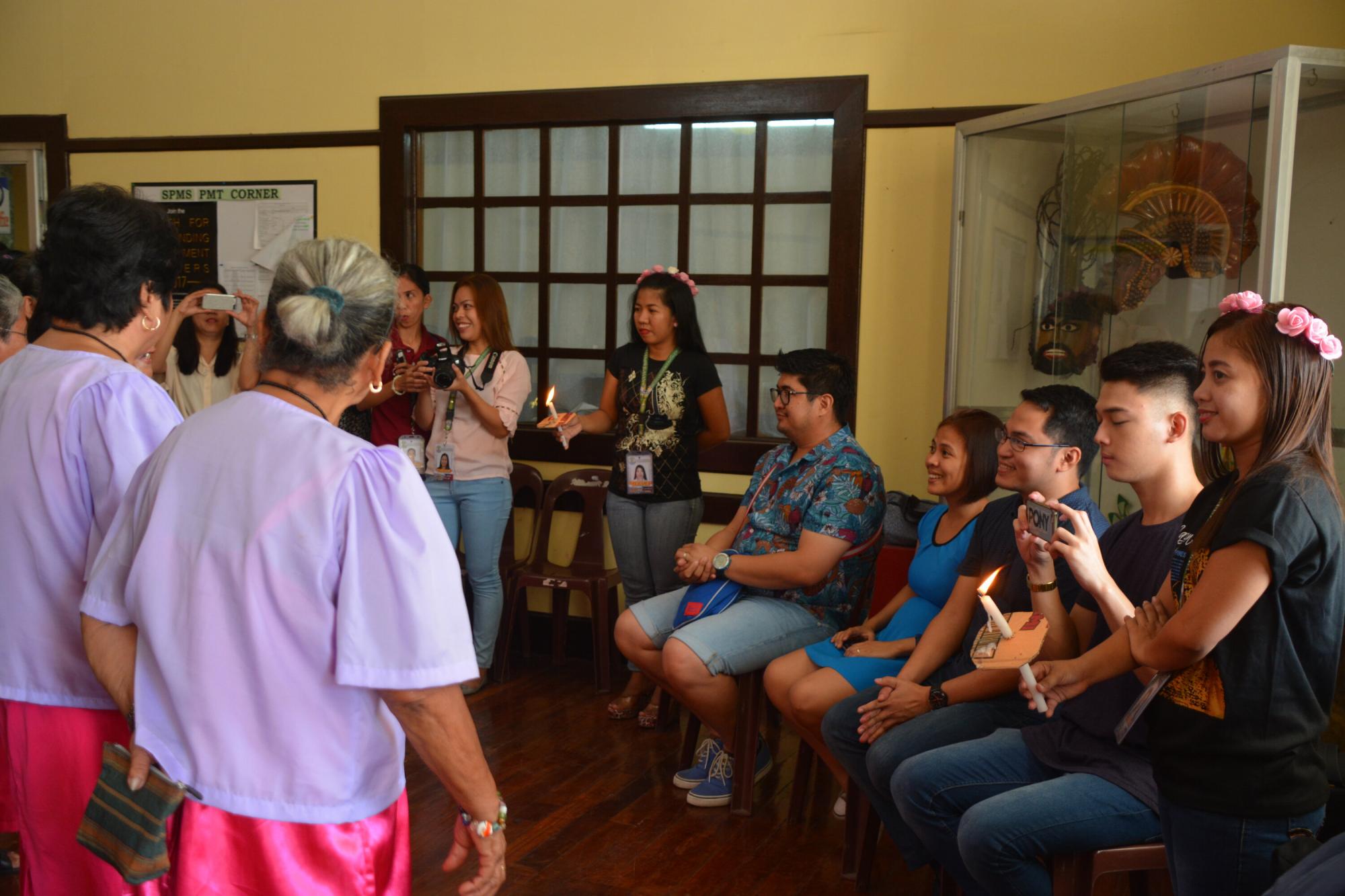
Fieldwork in Marinduque, Holy Week 2017.
Other Research Projects:
RESEARCH TITLE: Theatre and Cosmopolitanism: Looking for the Cosmopolitan Stage in Metro Manila | ROLE: Project Leader | DURATION: 18 Months (June 2015 - December 2016) | STATUS: Completed | FUNDING: UP Enhanced Creative Work and Research Grant (Php 500,000.00)
RESEARCH TITLE: Buhol-Buhol: Entanglement and Contemporary Theatre in the Philippines | ROLE: Project Leader | DURATION: 12 Months (September 2014 to August 2015) | STATUS: Completed | FUNDING: UP Diliman OVCRD (PhD Incentive Grant) and UP Office of the Vice President for Academic Affairs (Php 525,000.00)
RESEARCH TITLE: Imag(in)ing Saint Lucy: The Performative and Narrative Construction of the Kuraldal in a Small Fishing Village in Pampanga | ROLE: Project Leader | DURATION: 12 Months (June 2009 to May 2010) | STATUS: Completed | FUNDING: UP Diliman OVCRD Outright Research Grant (Php 300,000.00)

